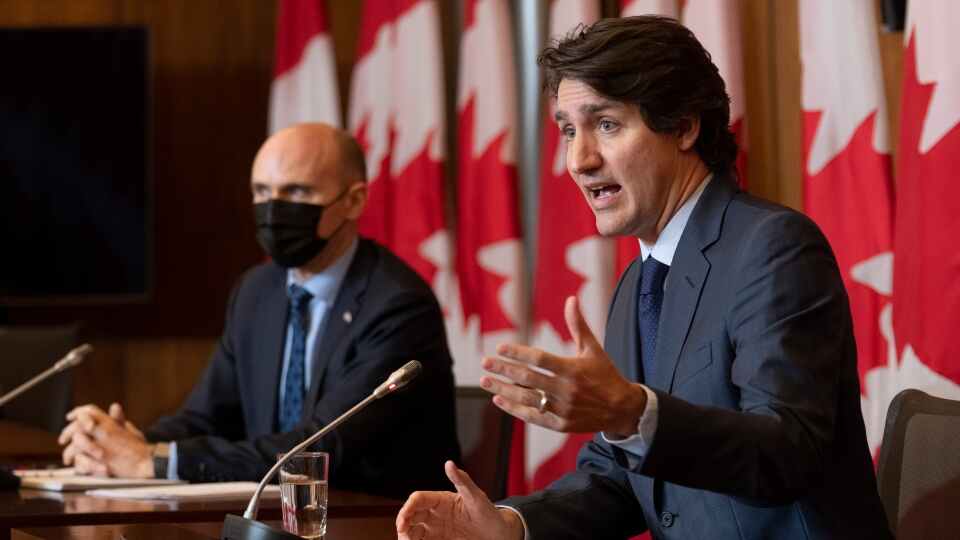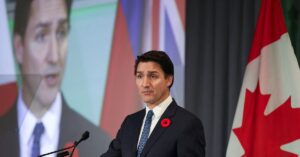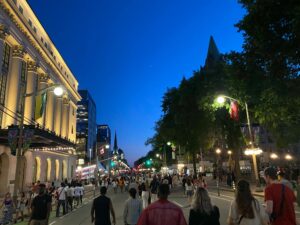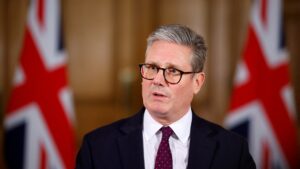
Saying COVID-19 treatment pill is no replacement for vaccination, Prime Minister Justin Trudeau is continuing to urge all Canadians to get their shots.
Batches of Pfizer’s anti-viral COVID-19 pill have already arrived in Canada. The Paxlovid treatment, which is in pill form and the first approved for use for COVID-19 in Canada so far, is a combination of two anti-viral medications — Ritonavir and Nirmatrelvir — which prevents the virus from replicating once it has infected a person.
However, Trudeau says the pill is not a silver bullet to ending the pandemic.
“It is not a replacement for getting vaccinated, for wearing masks, and keeping your distance,” he said.
Pfizer says its trials have shown the drug can cut the chance of hospitalizations or death by 89 per cent in adults when taken shortly after initial symptoms.
The criteria to be eligible for Paxloid significantly limits accessibility to the general population. In order to be considered for the treatment, candidates must 18 years and older with pre-existing conditions, making them at risk of being hospitalized.
The prime minister says the treatment is a step in the right direction but not a cure-all solution.
It is not a replacement for getting vaccinated, for wearing masks, and keeping your distance,” he said.
Pfizer says its trials have shown the drug can cut the chance of hospitalizations or death by 89 per cent in adults when taken shortly after initial symptoms.
The criteria to be eligible for Paxloid significantly limits accessibility to the general population. In order to be considered for the treatment, candidates must 18 years and older with pre-existing conditions, making them at risk of being hospitalized.
The prime minister says the treatment is a step in the right direction but not a cure-all solution.
Federal Health Minister Jean-Yves Duclos says only 35 per cent of Canadians have received their booster shot.
“Though the risk of hospitalization is individually lower for Omicron, the sheer volume of cases will likely keep increasing hospital admissions. These forecasts underscore that we must continue to exercise considerable prudence in order to limit the coming surge,” Duclos said.
Prime Minister @JustinTrudeau starts his COVID update by speaking about the new anti viral pill approved by Health Canada this week. Says it is not a replacement for vaccinations or other health measures, but another tool in this fight. #cdnpoli
— Cormac Mac Sweeney (@cmaconthehill) January 19, 2022
On Monday, Canada Chief Public Health Officer Dr. Theresa Tam said people who are not vaccinated against COVID-19 should be on the priority list for Paxlovid, saying, “this is a scientific and rational use of a drug that is in short supply.”
“We know that the unvaccinated are at higher risk of getting severe outcomes and getting hospitalized and ending up in the ICU. So, this is the evidence, and we’re following that evidence,” she said on Jan. 18.
“I think that as health-care providers, you don’t pick and choose which patients you have coming into the hospital and getting treated. I think this approach shows that we are prioritizing treatments to those most in need.”
Trudeau says with the continued strain on the health-care system, Canadians should be double vaccinated and boosted when they are eligible.
We now have enough doses so that everyone can be vaccinated and even receive a booster dose, so there is no excuse. People must be vaccinated,” Trudeau said.
Despite the surge in Omicron cases, all provinces are handling restrictions differently.
Starting Thursday, gyms and fitness centres in B.C., which have been completely closed since Dec. 21, will implement COVID-19 safety plans to reopen. This will include occupancy limits of seven square metres per person, up to as many as 25 people per space.
However, bars and nightclubs will remain closed.
Meanwhile, in Ontario, Premier Doug Ford announced loosened restrictions may be on the horizon.
The Saskatchewan Health Authority says it is bracing for a tide of COVID-19 hospitalizations and absenteeism among workers until mid-February, while Alberta says hospitalization rates are rising to levels not seen since mid-October.
The growing number of COVID-19 cases and hospitalizations in Prince Edward Island has prompted the province to reduce gathering sizes and close gyms and restaurant dining rooms until at least the end of the month.
Today’s #COVID19 #Epidemiology in Canada Daily Update: https://t.co/2586g1O35R pic.twitter.com/n2zLKiE6JS
— Canada's CPHO (@CPHO_Canada) January 19, 2022
In Canada, quarantine rules are set by provinces and territories, except as it relates to international travellers. But the Public Health Agency of Canada still recommends people infected with COVID-19 isolate for at least 10 days after they test positive or symptoms begin, whichever came first.
Every province and territory has stopped following that advice, starting with Ontario and Saskatchewan on Dec. 30.







